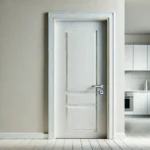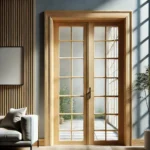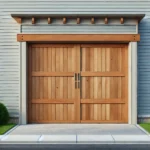Sliding doors have become an essential feature in modern architecture and interior design, celebrated for their sleek functionality and ability to transform spaces. Their unique mechanism and aesthetic appeal make them an excellent choice for both residential and commercial applications. With their smooth operation and minimalist design, sliding doors bring a sense of elegance and practicality to any environment, redefining how we interact with interior and exterior spaces.
One of the most notable features of sliding doors is their ability to save space. Unlike traditional hinged doors that require a wide arc to open and close, sliding doors glide along a track parallel to the wall. This mechanism eliminates the need for additional clearance, making sliding doors an ideal solution for compact spaces or areas where maximizing floor space is crucial. From small apartments to large, open-plan homes, sliding doors offer a seamless way to enhance functionality while maintaining a clean and uncluttered aesthetic.
Sliding doors are highly versatile, with applications that extend beyond their conventional use. They can serve as entrances to patios, balconies, or gardens, creating a fluid connection between indoor and outdoor spaces. This feature is especially beneficial for homes that prioritize natural light and ventilation. Large glass panels in sliding doors allow sunlight to flood interior spaces, creating a bright and inviting atmosphere. This natural illumination not only enhances the aesthetic appeal of a room but also contributes to energy efficiency by reducing the need for artificial lighting during the day.
The design possibilities with sliding doors are virtually endless, making them adaptable to various architectural styles and personal preferences. Modern sliding doors often feature frameless glass panels for a minimalist look, while traditional designs may include wooden frames or decorative elements to complement classic interiors. Materials such as aluminum, steel, and composite are also popular choices, offering durability and contemporary appeal. These options allow homeowners and designers to select sliding doors that seamlessly integrate with the overall theme of a space.
The use of sliding doors is not limited to residential settings. In commercial spaces, they play a significant role in enhancing functionality and aesthetics. Offices often incorporate sliding doors to create flexible workspaces, conference rooms, or partitions, promoting collaboration while maintaining privacy when needed. Retail stores and restaurants use sliding doors to create open and welcoming entrances, encouraging foot traffic and enhancing the customer experience. Their ability to blend seamlessly into various environments makes sliding doors a preferred choice for businesses aiming to achieve a polished and professional look.
Sliding doors also excel in providing accessibility and convenience. Their smooth operation makes them easy to use for individuals of all ages, including children and those with mobility challenges. Automated sliding doors, commonly found in commercial and public spaces, offer hands-free operation, enhancing accessibility and hygiene. These doors use sensors or buttons to open and close, ensuring a seamless experience for users while reducing physical contact.
In addition to their functional benefits, sliding doors contribute to the aesthetics of a space. They have a clean and streamlined appearance that adds a touch of sophistication to interiors and exteriors. The expansive glass panels commonly used in sliding doors provide unobstructed views, making them an excellent choice for homes with scenic surroundings. Whether overlooking a garden, pool, or city skyline, sliding doors frame these vistas like a living picture, enhancing the connection between the interior and the environment beyond.
Soundproofing is another advantage offered by sliding doors, especially in spaces that require privacy or noise reduction. Modern sliding doors with double or triple glazing provide effective insulation against external noise, creating a quiet and comfortable indoor environment. This feature is particularly valuable in urban settings, where traffic and city sounds can disrupt the tranquility of a home or workspace.
Energy efficiency is a key consideration in contemporary design, and sliding doors contribute significantly in this regard. High-quality sliding doors with insulated glass and weatherstripping help regulate indoor temperatures, reducing heat loss in the winter and heat gain in the summer. This energy efficiency not only enhances comfort but also lowers energy bills, making sliding doors a practical and sustainable choice for eco-conscious homeowners.
The integration of advanced technology has further elevated the functionality of sliding doors. Smart sliding doors equipped with sensors, remote controls, or home automation systems offer unparalleled convenience and security. These doors can be programmed to open or close at specific times, controlled via smartphones, or synced with other smart devices for a fully automated experience. Features like locking systems and motion detection add an extra layer of safety, ensuring that sliding doors meet the demands of modern living.
Sliding doors are also an excellent way to define and divide spaces within a home or building. Interior sliding doors can separate rooms while maintaining an open and airy feel, making them ideal for open-plan layouts. Frosted or textured glass panels in sliding doors provide privacy while allowing light to filter through, striking a balance between openness and seclusion. These doors are often used in bedrooms, bathrooms, or home offices, where maintaining a sense of personal space is essential.
The durability of sliding doors ensures they remain a long-lasting investment. Materials like aluminum and tempered glass are resistant to wear and tear, making sliding doors suitable for high-traffic areas. Regular maintenance, such as cleaning the tracks and inspecting the rollers, ensures smooth operation and extends the lifespan of the doors. With proper care, sliding doors can retain their functionality and appearance for years, offering excellent value for money.
Customization options allow homeowners to personalize sliding doors to suit their specific needs and tastes. From the choice of materials and finishes to the size and design of the panels, sliding doors can be tailored to complement any space. For example, large sliding doors with expansive glass panels create a dramatic effect in living rooms or dining areas, while smaller, more discreet designs work well in closets or pantries. The versatility of sliding doors makes them an adaptable solution for a wide range of applications.
Sliding doors have also gained popularity in sustainable design, as they align with eco-friendly principles. The use of recycled materials, energy-efficient glazing, and sustainable manufacturing processes make modern sliding doors a greener choice. Additionally, their ability to enhance natural lighting and ventilation reduces reliance on artificial climate control systems, further contributing to energy savings and environmental conservation.
In conclusion, sliding doors are a remarkable blend of functionality and style, offering countless benefits for both residential and commercial spaces. Their space-saving design, aesthetic versatility, and modern features make them a valuable addition to any environment. Whether used to frame stunning views, create flexible interiors, or enhance energy efficiency, sliding doors continue to redefine the boundaries of architecture and design. As a timeless and innovative solution, they remain a favorite choice for those seeking to elevate their spaces with elegance and practicality.
![]()






One thought on “The Versatility and Elegance of Sliding Doors”